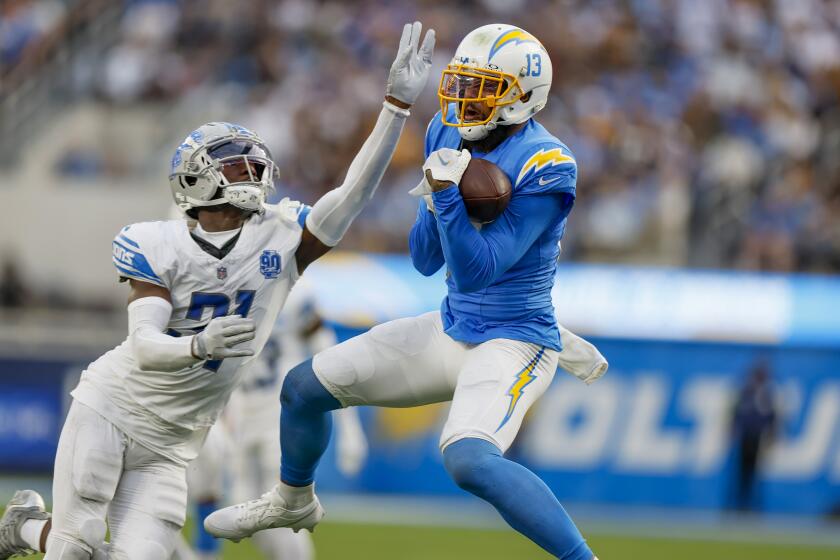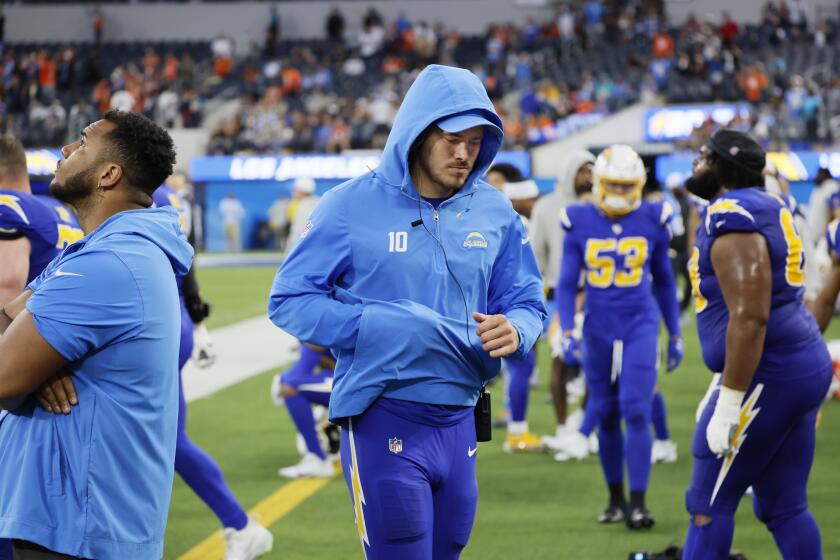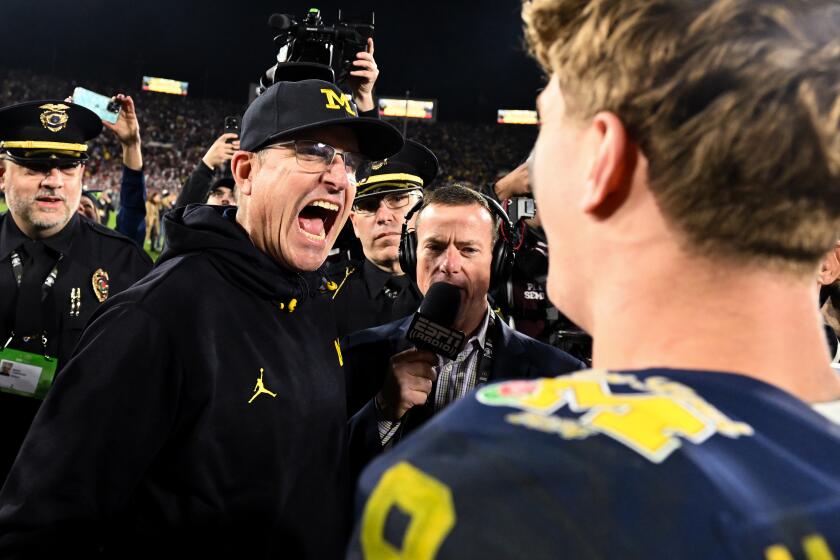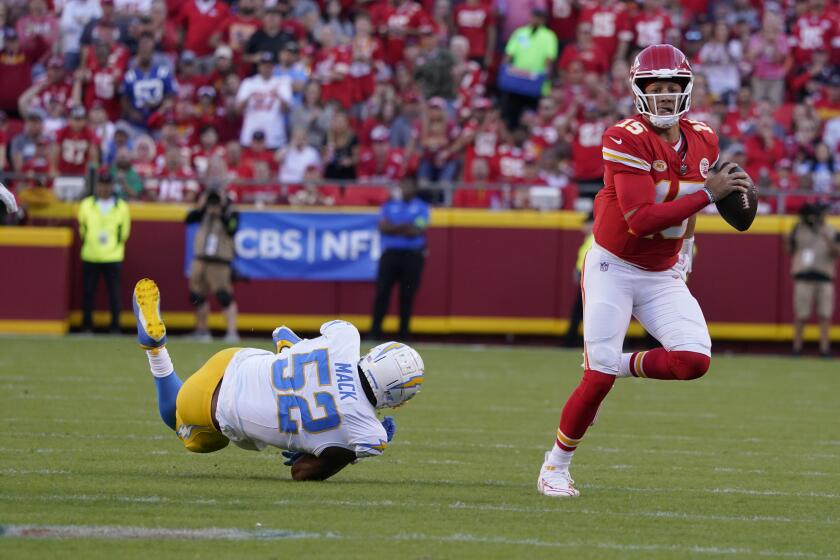Chargers got more ‘Tongan Power’ than expected when they drafted Tuli Tuipulotu
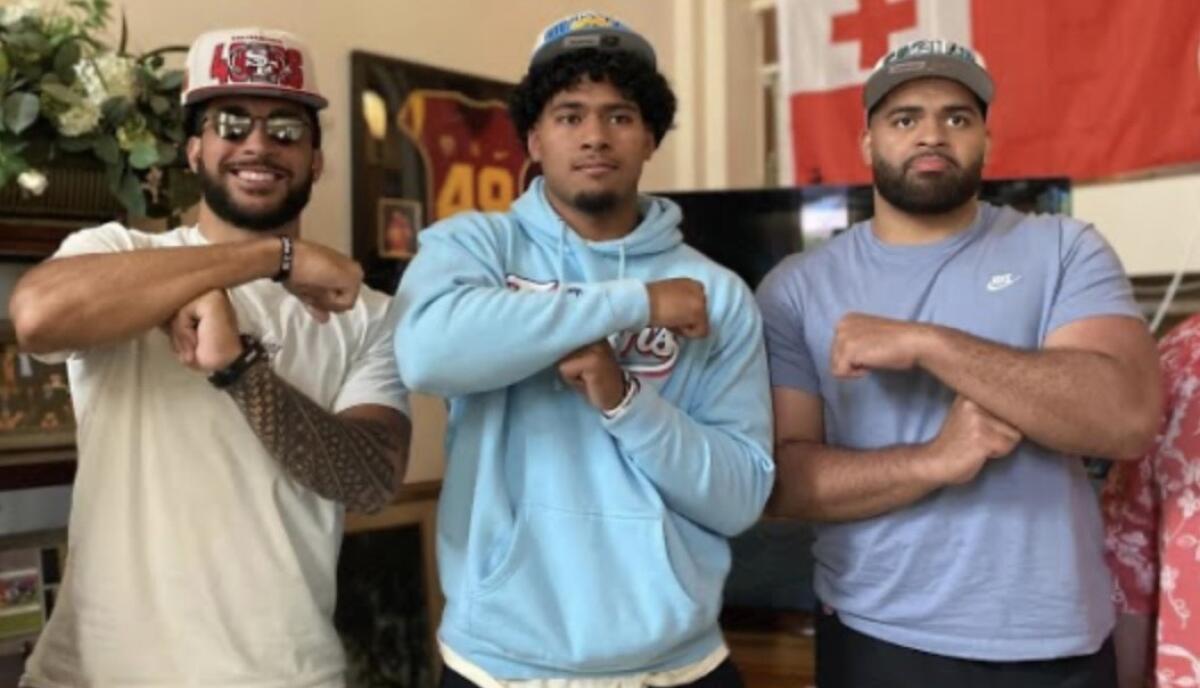
It’s where he is from, most assuredly, even if he never has been there.
So, for years now, he has punctuated significant plays on the football field by forming a capital “T” with his arms in celebratory tribute to Tonga.
That’s how deeply Tuli Tuipulotu’s roots push into the island nation’s sandy soil, the heart of the Chargers’ young edge rusher belonging to a place that never has known his footprints.
His father, Niuila — just like his mother, Tania — speaks almost exclusively Tongan, at least, that is, when he speaks at all. “My pop’s,” Tuipulotu said, “a pretty humble dude.”
Until Tuipulotu was born, his family didn’t know if he would arrive as a boy or a girl because they valued the surprise of it all. Then the doctor walked into the waiting room and announced, “We have another football guy.”
Chargers receiver Keenan Allen and edge rusher Khalil Mack make the AFC Pro Bowl team after putting together career-best seasons in off year for team.
Soon thereafter, this latest football guy’s life began with something of a handoff, Tuipulotu’s mother asking her sister, Lupe Fosnight, for help in raising her fourth son, a practice not uncommon among the islanders.
Tuipulotu understands more Tongan than he speaks, though he knows enough that, while attending USC, he was able to test his way out of a foreign language requirement.
He and his parents, still today, mostly are limited to what he called “little conversations.” Recognizing the words, however, wasn’t required for receiving the message — the message that, for this kid born in L.A., Tonga matters.
“Tuli has seen that the island is real,” Fosnight said. “He has seen it because we wanted to keep that alive in him.”
With the Trojans, Tuipulotu played with his brother, Marlon, and cousin, Talanoa Hufanga. All three are now in the NFL, Marlon a defensive tackle for Philadelphia and Hufanga a safety for San Francisco.
Before each game in college, they would meet in the end zone to share a moment and a prayer, family and faith — as always — beautifully intertwined. One of Tuipulotu’s favorite pictures shows the three of them kneeling near the goal line in the Coliseum, their heads bowed.
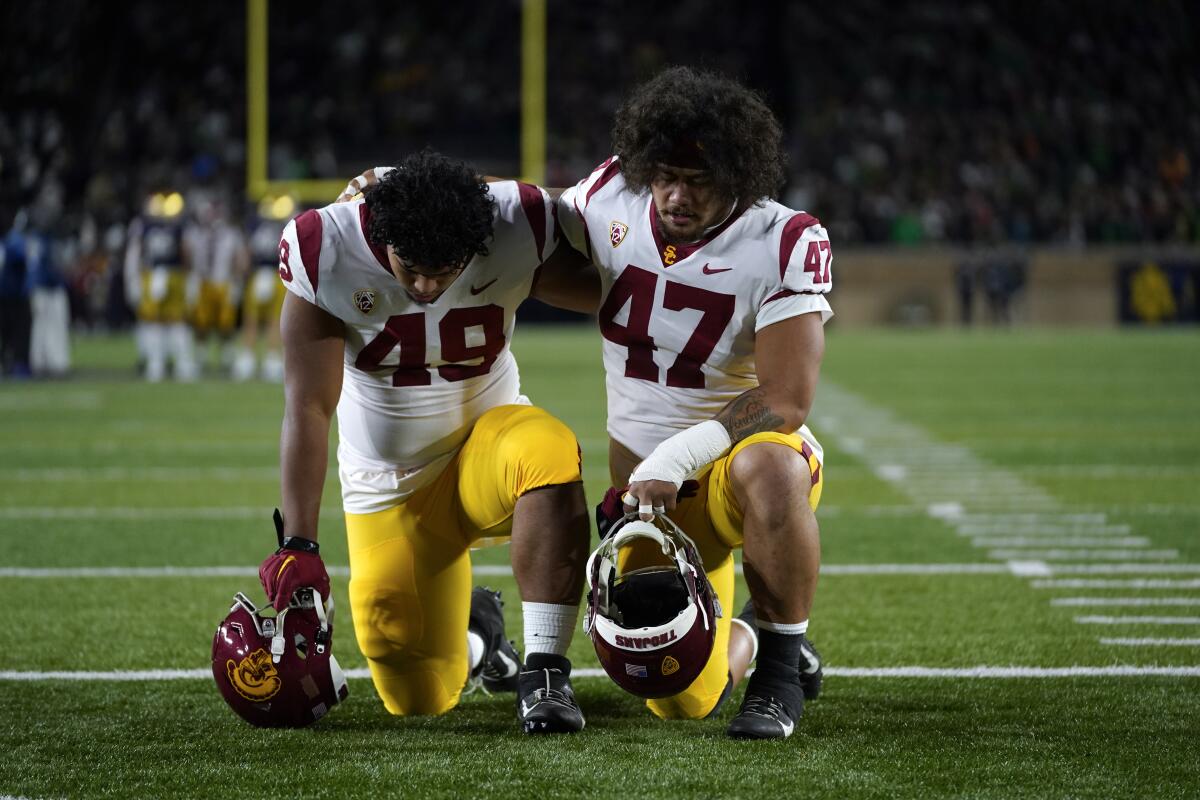
Throughout this season — Tuipulotu’s first in the NFL — the trio has maintained a texting thread dotted with messages such as “Put on for the Tzzzzzzz” and “Big Tzzzzzzz.”
The T, of course, stands for Tonga. And all of those Z’s? “Just a little spice,” Tuipulotu explained.
He was only a three-star recruit and didn’t have any college offers until his junior year at Lawndale High. Tuipulotu didn’t even play football until he arrived at the school as a freshman.
On Sunday, he’ll finish a rookie year during which he has become a find for a team that largely has lost, the 5-11 Chargers having fired their head coach and general manager and approaching an offseason of perhaps extensive roster slashing.
What the Chargers new coach and general manager will inherit. Their costly, unsuccessful roster needs to be revamped and some big names might have to go.
But, for Tuipulotu, this is about more than wins and losses, more than the Chargers. It’s about those roots and that sandy soil and the pride he feels for a land more than 5,000 miles of Pacific Ocean away but still visible in the faces of those closest to him.
“Me, I’m an underdog,” Tuipulotu said. “Being Tongan and trying to make it is another part of being an underdog. As the underdog, we’re trying to put the world on notice that we can play this game too.”
He was born Tulikihelotu Amanakilelei Kihekahau Tuipulotu, which was too long to fit on the birth certificate the hospital gave his family.
It was Fosnight who named the boy, doing so with as much intention as love, Tuli Tuipulotu loosely translating to “run to the church.” His middle names were borrowed from Fosnight’s two brothers and basically mean “best wishes for the future.”
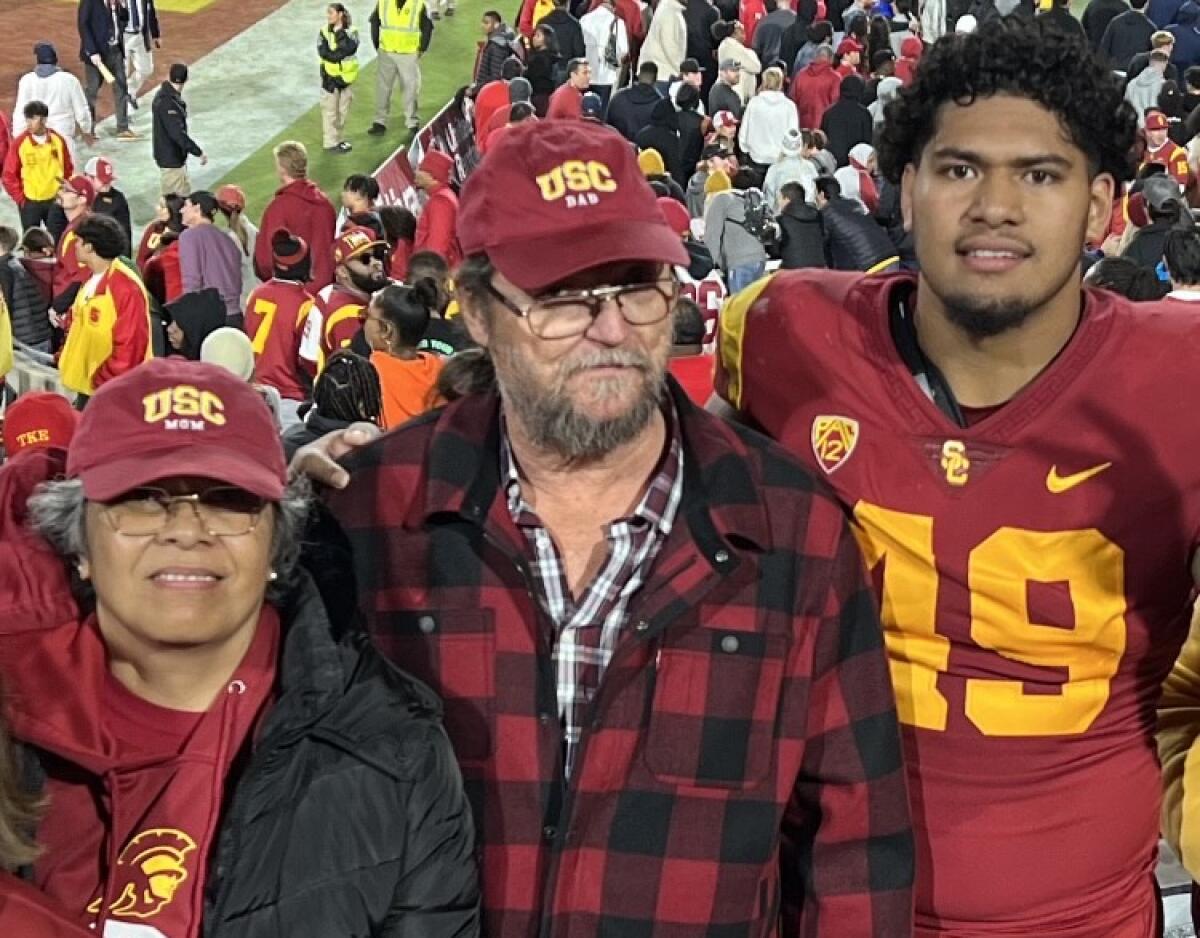
From early on, Tuipulotu called Fosnight “mom” — which he still does — while typically referring to his biological parents by their first names. He grew up under all of them, living at times in Los Angeles and other times in Newport Beach.
Much of his family left Tonga in the 1990s in search of better lives 1,500 miles to the southwest in New Zealand, where all three of Tuipulotu’s older brothers — Sione Toetuu, Opeti and Marlon — were born.
Fosnight first moved to Southern California and Tuipulotu’s biological mother, after visiting one Christmas, followed a short time later. Niuila eventually joined Tania here and, after about three years, the couple had Tuli.
With two mothers and so much parenting, he was raised to be respectful, another part of anga fakatonga (the Tongan way). When Tuipulotu first greeted Chargers teammate Khalil Mack, he addressed him as “sir,” the veteran edge rusher joking that anything more than “Mr. Mack” seemed excessive.
(During the reporting of this story, Fosnight also routinely ended text messages with “sir.”)
“I couldn’t picture myself being disrespectful to someone who was trying to help me,” Tuipulotu said. “I try to do everything the right way and hope I get repaid for it.”
While Tuipulotu was growing up, Fosnight said she took only two calls from school. Once, a teacher commended Tuipulotu for helping a classmate who had become ill. The other time, she was told that Tuipulotu had punched a boy but did so because he was protecting himself and a few others against a bully.
“He’s not close to the smart kids,” Fosnight recalled a teacher once telling her. “He’s close to the kids that need help.”
Tuipulotu’s winning athletic career began with a resounding defeat. In seventh grade, he was cut from the basketball team at Corona del Mar Middle School, a crushing fate that left him silent and sitting teary-eyed on the curb outside the gym when Fosnight arrived to pick him up.
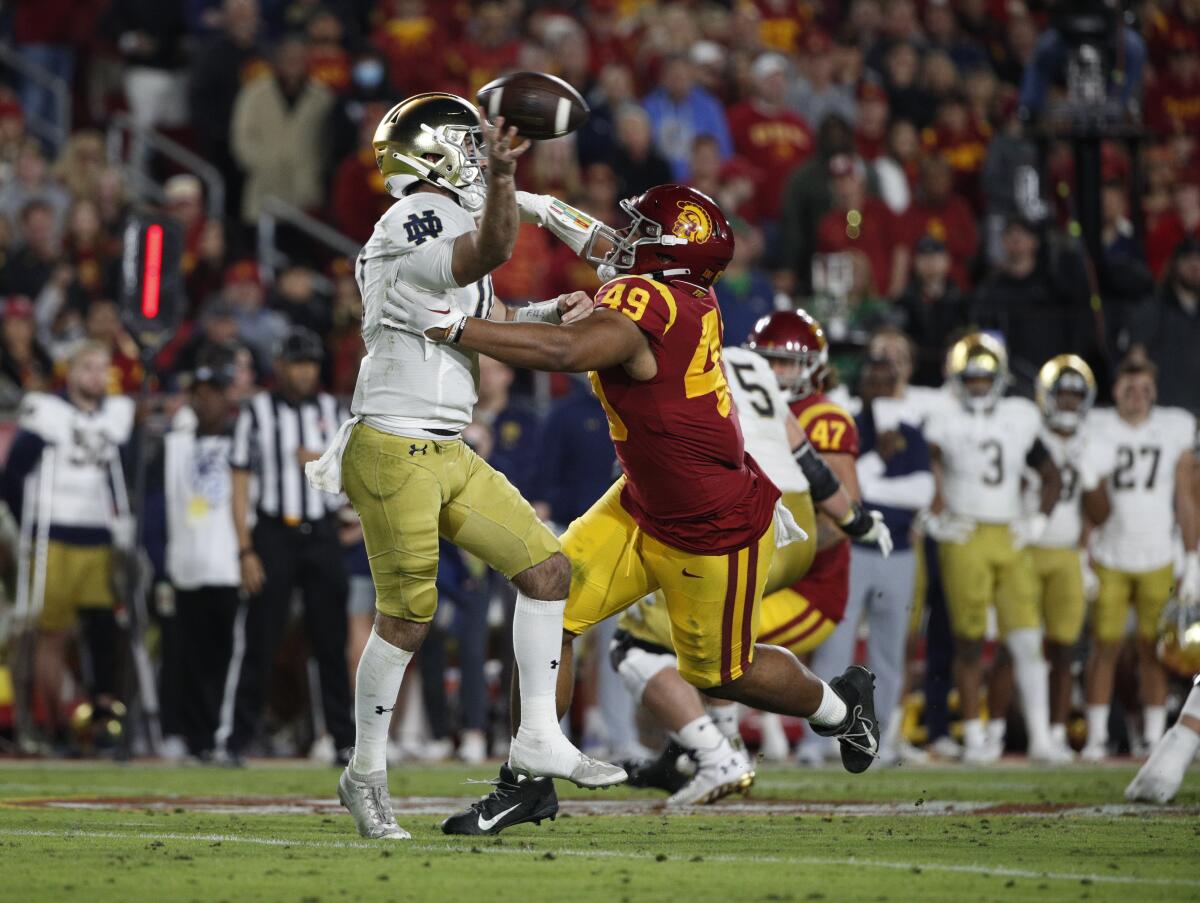
It took Tuipulotu hours to finally confess what had happened, the kid literally seeing a painful reminder every time he looked down. On his feet, there were a pair of all-blue sneakers he had a purchased in the school’s colors because he was so certain he would make the team.
Football would be Tuipulotu’s better path, a high school late bloomer making it — largely on potential — to USC, where he played right away as a freshman, recording five tackles in his second game and, a week later, his first sack.
But that’s not what Tuipulotu remembers about that third game, in November 2020, at Utah. He recalls instead that the night marked the first time he started alongside his brother and cousin.
“It was a big moment,” Tuipulotu said. “We just came together and said, ‘Damn, we’re here. All three of us.’ ”
“You knew he was going to be good. You just figured it would take a year or two. When he started doing things in the regular season, it was, ‘Well, I guess he didn’t need a year or two.’ ”
— Chargers right tackle Trey Pipkins III, on teammate Tuli Tuipulotu
The self-perceived underdog emerged quickly and steadily with the Trojans. After three seasons, Tuipulotu was a big-time NFL prospect, an athletic pass rusher ready for a league always ready for athletic pass rushers.
On Day 2 of the 2023 draft, a party was planned at Fosnight’s home in Orange County. Only immediate family was expected, Tuipulotu uncomfortable with anything more.
By the time the Chargers choose him in the second round, at No. 54 overall, nearly 100 people were there, spilling into the backyard, playing cards, dancing to music — Polynesian, reggae, Tongan — and eating.
“That’s how we are, sir,” Fosnight said. “That’s who we are. When the people heard we had something going on, they just walked in.”
Some were distant relatives and others close neighbors. Many were friends from Siasi Tonga Tau’ataina, the Free Church of Tonga, Tuipulotu’s family being long-time members of the branches in Compton and Inglewood.
Fosnight also made sure Tuipulotu’s brother and cousin were there because she thought it was important for the three of them — after Tuipulotu was selected — to pray together again.
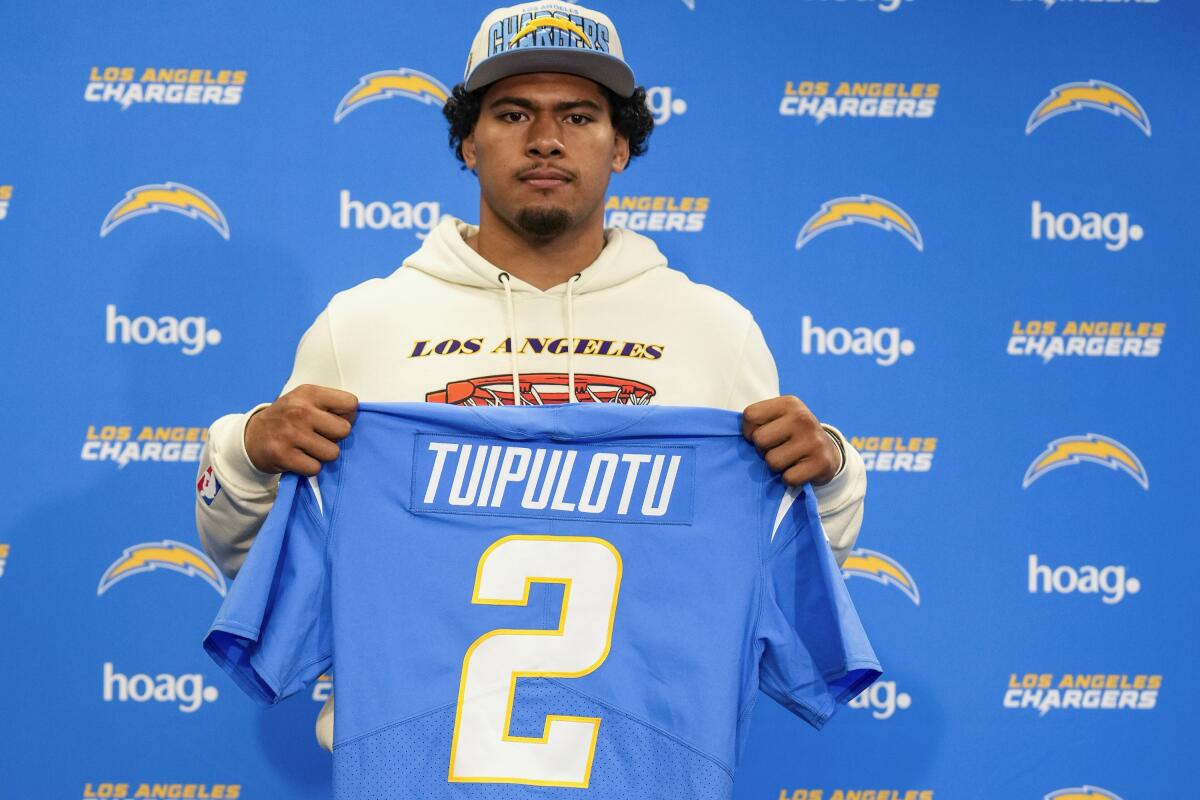
When the Chargers called him, Tuipulotu was playing spades. He was wearing a Dodgers cap and a hoodie that, across the chest, read “Tongans.”
He moved into the living room, sat down on a couch between Fosnight and her husband, Ken, while two of his nieces scrambled onto his lap.
A few minutes later, when the announcement came through the TV screen, the house shook with sound and someone led the group in a “1, 2, 3 … L.A. Chargers!” chant.
Shortly after the moment passed, the TV went dark and the room silent. A pastor gathered the family for a prayer and a hymn of thanksgiving, all in Tongan.
Tuipulotu sat on the floor, his eyes closed, his head tilted down. He did his best to follow along.
“I can understand the beginning of the prayers, when he starts saying people’s names, and then the end,” Tuipulotu said. “I get a good amount, bit by bit, and can kind of piece it all together.”
Much of this same group gathered again in early September, a week before he made his NFL debut, this time at the church in Compton. It was Tuipulotu’s 21st birthday.
He said he doesn’t drink and admitted that welcoming 21 at a church isn’t what most people would choose to do. He also said that, at first, he didn’t really want to be there, didn’t want all the attention.
Despite Michigan’s thrilling Rose Bowl win, Jim Harbaugh must be sick of coaching college football. He should take over the Chargers’ coaching job.
When it came time to blow out the candles, Tuipulotu allowed a few of the kids to do it for him. He also spent a part of the day sitting in the corner, eating off a plate on his lap, partially hidden behind those same kids.
“That’s just who Tuli is,” Fosnight said. “He got the quiet from his dad.”
From Niuila, he also inherited an ability to make noise on an athletic field. Tuipulotu’s father, a man with a square face and a granite jaw, grew up playing rugby and excelled as a hard hitter.
Early in his first NFL training camp, the 6-foot-3, 266-pound Tuipulotu became a regular subject among the Chargers’ offensive linemen, someone in the group almost daily recounting a play he had made in practice.
Rashawn Slater can still recall the first time Tuipulotu bull-rushed him, the impact resonating through the left tackle’s thick chest and putting him on his heels.
“It was a lot more than I expected,” Slater said. “Pretty much right there I was like, ‘OK, you gotta bring it with this kid or you’re in trouble.’ ”
Tuipulotu had a tackle for loss in his debut against Miami and followed with sacks in both Weeks 2 and 3.
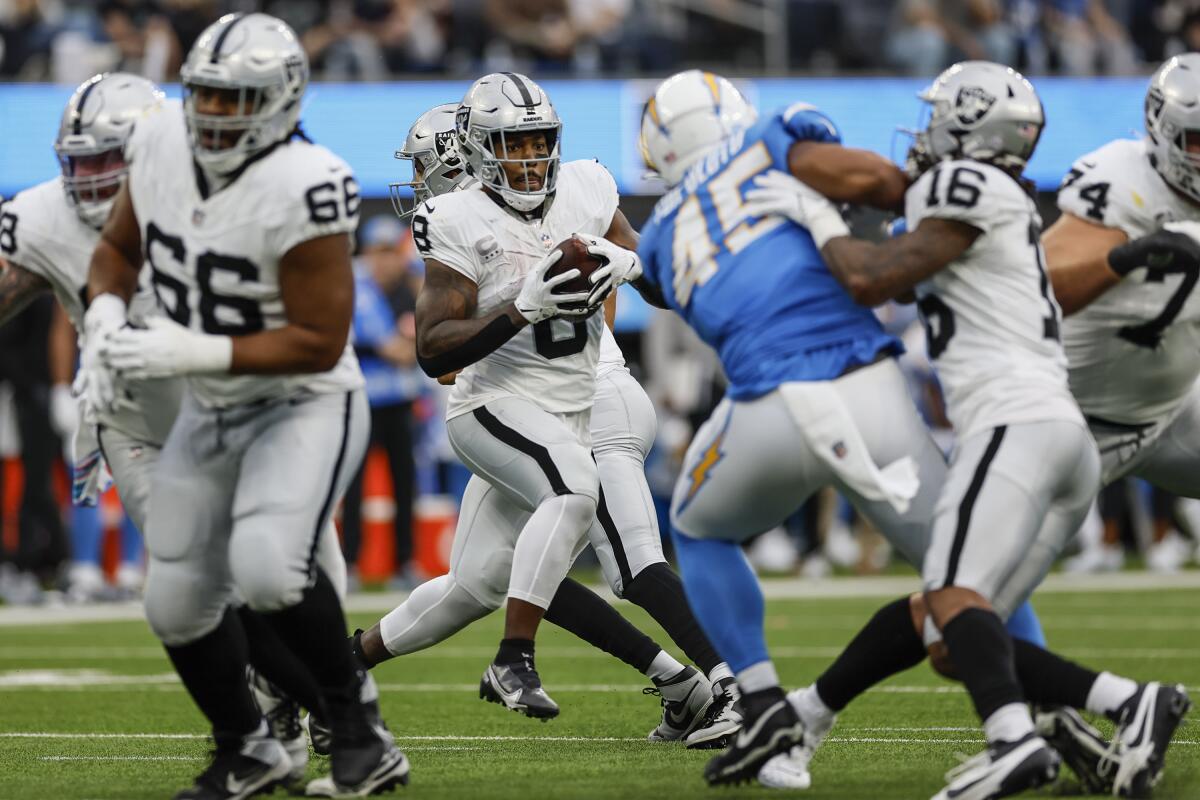
The same weekend Tuipulotu dropped Minnesota quarterback Kirk Cousins, his brother sacked Tampa Bay’s Baker Mayfield and his cousin intercepted the New York Giants’ Daniel Jones.
In early November in New York, Tuipulotu had his first multiple-sack game when he got to the Jets’ Zach Wilson twice on “Monday Night Football.”
“You knew he was going to be good,” Chargers right tackle Trey Pipkins III said. “You just figured it would take a year or two. When he started doing things in the regular season, it was, ‘Well, I guess he didn’t need a year or two.’ ”
Despite his production, Tuipulotu doesn’t possess Mack’s cartoonish abs or Joey Bosa’s pronounced quads. What he does have is a playing strength that far exceeds anything Tuipulotu can push around in the weight room.
On a typical Monday after a game, the Chargers’ players do their heaviest lifting of the week, focusing on flushing their lower bodies.
Linebacker Kenneth Murray Jr. said he normally squats “something north” of 500 pounds on Mondays. Tuipulotu said he “doesn’t touch” anything over 325.
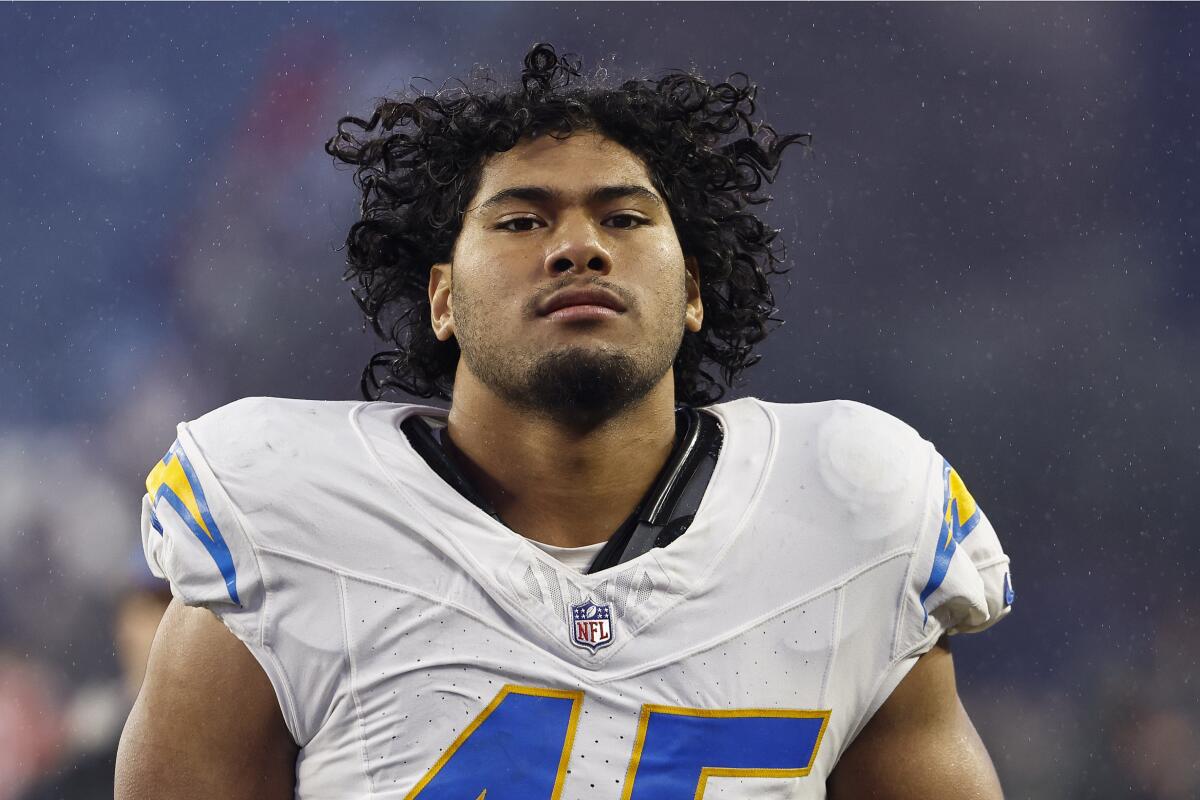
And, yet, he can send offensive linemen reeling and topple tight ends like tackling dummies.
“I think it’s just different on the field,” Tuipulotu said. “I feel like I can use more of all my body. In the weight room, it’s all legs or all arms.”
After a pause, he smiled and added, “It’s Tongan power.”
Asked about the concept of “Tongan power,” Mack smiled too.
“I didn’t want to say that,” Mack said. “I didn’t know if it was going to be a racist slur or what. But that could be it. … We’ll go with him saying it.”
After the weekend during which Tuipulotu, his brother and his cousin each had a highlight moment, Brian Baldinger brought attention to the three.
A former NFL offensive lineman and current analyst for the league’s television network, Baldinger produced a video package of the family’s big weekend, the piece including all three players flashing the celebratory “T.”
“Bang! Bang! Bang!” Baldinger shouted as Tuipulotu three times crossed his “T” — thrusting forward his right forearm and intersecting it with his left fist — for emphasis.
NFL Week 18 picks: Both Saturday games, Steelers-Ravens and Texans-Colts, have playoff implications as well as the final game of week, Bills-Dolphins.
They started flashing the gesture at USC, Tuipulotu said, though he admitted he’s not sure if he, Marlon and Hufanga were the first Tongans to display the “T.” He is certain, however, that they were the ones who made it popular.
Now, Tuipulotu sees other college players doing it. Recently, Chargers interim head coach Giff Smith showed Tuipulotu a video of two high school players celebrating with the “T” during a game.
He doesn’t yet have plans to visit Tonga but said that would change “for sure soon.” He knows the island only through stories, through pictures ... through the eyes of those who raised him.
“I want to go there to experience everything, experience what my parents went through, see the villages where they grew up,” Tuipulotu said. “I’m not really a traveling guy. But that’s one place I’ll go. You know, back to the motherland.”
Back all right. Back to where his story began, to where his inspiration first stirred, to where Tuli Tuipulotu, most assuredly, is from. Back, for the first time.
Breaking down how the Chargers (5-11) and Chiefs (10-6) match up heading into their game Sunday. Jeff Miller makes a prediction.
More to Read
Go beyond the scoreboard
Get the latest on L.A.'s teams in the daily Sports Report newsletter.
You may occasionally receive promotional content from the Los Angeles Times.

